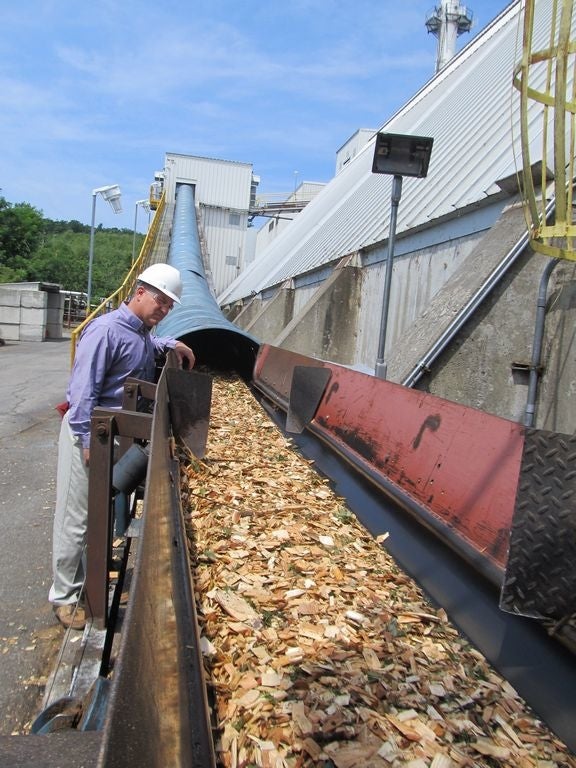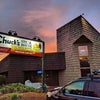State May Take Some Fire Out Of Biomass, Regulations Could Impact Fitchburg Plant
 Photo | Emily Micucci
Gus Bakas, plant operations manager at Pinetree Power in Fitchburg, surveys wood chips to be processed for biomass energy outside the plant. Pinetree, which sells power to Unitil Corp., is the state's only wood biomass plant.
Photo | Emily Micucci
Gus Bakas, plant operations manager at Pinetree Power in Fitchburg, surveys wood chips to be processed for biomass energy outside the plant. Pinetree, which sells power to Unitil Corp., is the state's only wood biomass plant.
At first glance, Pinetree Power, a wood biomass energy plant in Fitchburg, seems poised for success.
The plant, which straddles the Fitchburg-Westminster line on Rowtier Drive, sells energy to Unitil Corp. The scent of fresh pine fills the air as the plant processes ton after ton of wood chips sold to the company by vendors, like loggers and landscapers, from within a 50-mile radius. It's the only wood biomass plant operating in Massachusetts.
But regulations issued by the Massachusetts Department of Energy Resources (DOER) could make continuing to do business a challenge, and stall construction of a handful of biomass plants in Western Massachusetts.
"It doesn't make it easy for us, or encourage us to look at future development in biomass," said Gus Bakas, director of plant operations at Pinetree Power, which is owned by the London-based company GDF Suez.
Biomass energy, which includies wood, solar, wind, and water power, makes up a relatively small piece of the Massachusetts energy mix. Of the 1,426 trillion British thermal units (BTUs) generated in 2009, just 61.7 trillion came from biomass sources, according to the U.S. Energy Information Administration. Natural gas and petroleum remain, by far, the dominant sources.
As for wood biomass, Bakas notes that there are misconceptions about the industry. While some assume Pinetree uses premium lumber for power, he said the wood is harvested from trimming tree tops and small trees.
"We don't cut down forests to make power," Bakas said.
The DOER is on the verge of implementing strict greenhouse gas emissions standards so that wood-burning energy producers can qualify for renewable energy credits, or RECs, from the state.
Pinetree Power doesn't qualify because the plant, which employs 20 people, doesn't meet the emissions standards, nor is it new construction—another DOER stipulation. Industry insiders say the standards, aimed at reducing the state's carbon footprint, are the strictest in the nation, and it's unlikely any wood biomass plant will be able to meet them and be profitable.
"(Officials) have essentially regulated out of existence any biomass-to-electricity plants," said Bob Cleaves, president of the Biomass Power Association, the Maine-based organization that represents the industry nationally.
Efficiency Threshold
To qualify for RECs, Massachusetts biomass plants will have to install combined heat and electricity systems to meet the required threshold of 50-percent energy efficiency, which Cleaves said is a multimillion-dollar investment that's not economically feasible for most companies.
It's not illegal for a developer to build a wood biomass plant, but without RECs, Cleaves said no one will. Biomass energy can't compete with fossil fuels cost-wise, so state incentives are crucial.
Gov. Deval Patrick said Massachusetts was setting a precedent when he first proposed new biomass regulations in May 2011, saying the Bay State was "way ahead of the pack nationally when it comes to clean energy policy."
Cleaves agrees. Officials from BPA and others testified against the new regulations before the Legislature during a public comment period in June.
"It's very important that the precedent not be established elsewhere, and hopefully reverse itself in Massachusetts," Cleaves said.
While Cleaves contends that wood biomass regulations are excessive, as most states consider wood a renewable energy resource that replenishes itself over time, DOER officials stand by them. They cite a study by the Manomet Center for Conservation Sciences that stated wood biomass production is not carbon neutral, and will produce more emissions than coal-fired energy plants by 2050.
Fifty-three comments were submitted to the DOER during the public comment period, according to Commissioner Mark Sylvia. He said the department is considering how those will impact the proposed regulations, which he expects will be implemented by the end of the year.
Working Toward A Solution
"We have been very thoughtful and encouraged stakeholder comment and engagement … from all sides of the issue, and we're working toward a regulation that is reflective of science and our goal of reduction in greenhouse emissions," Sylvia said.
A few years back, new competition seemed to be creeping up on Pinetree. Several developers had proposed wood biomass plants in a number of Western Massachusetts towns, enticed by the prospect of RECs offered to their industry. But that all changed when the results of the Manomet study were released.
Peter Bos, the developer who proposed building Russell Biomass in the town of Russell, said he invested millions of dollars by the end of 2009. Now, his project has stalled and its future is uncertain.
"Probably no biomass plant will be able to achieve a 50-percent overall efficiency. If any can do so, it will be the large, most efficient plants. Small, and less efficient, community type biomass plants … will not develop at all." Bos said in an e-mail.
Where does this leave Pinetree Power? The agreement with Unitil ends in October, giving the plant no choice but to compete with cheaper energy sources in the market. The prospects, according to Bakas, are grim.
"We have some challenges we need to evaluate," Bakas said.
Boost For Wastepaper?
Company officials are now working with the Legislature to secure some sort of incentive for the energy the plant produces through burning waste paper generated by International Paper Products of Westfield.
Though wood burning generates 70 percent of Pinetree's energy supply, scrap paper products account for about a quarter. Bakas believes an energy incentive is appropriate because the scraps would otherwise be dumped in a landfill.
If that's not successful, Pinetree Power must consider installing new infrastructure to qualify for RECs in other states that offer incentives to existing plants. That project will likely cost about $5 million, Bakas said.
State Rep. Stephen DiNatale, D-Fitchburg, is advocating in the Legislature on Pinetree Power's behalf to have language inserted into a pending energy bill that would grant an incentive for the paper-burning piece of the business. But DiNatale did not expect lawmakers to reach a decision on that before this year's legislative session ended last week.
Environmental concerns must be balanced with the need to maintain jobs and industry, according to DiNatale.
"I'd rather not regulate people out of business," DiNatale said.
Read more
Energy Chief: State Must Stay Involved In Renewable Energy
AMSC Increases Revenue, Narrows Losses
Drop In Natural Gas Prices Highlights Start Of N.E. Heating Season
Officials Hope New Technology Will Expand Wind Energy In Central Mass.









0 Comments